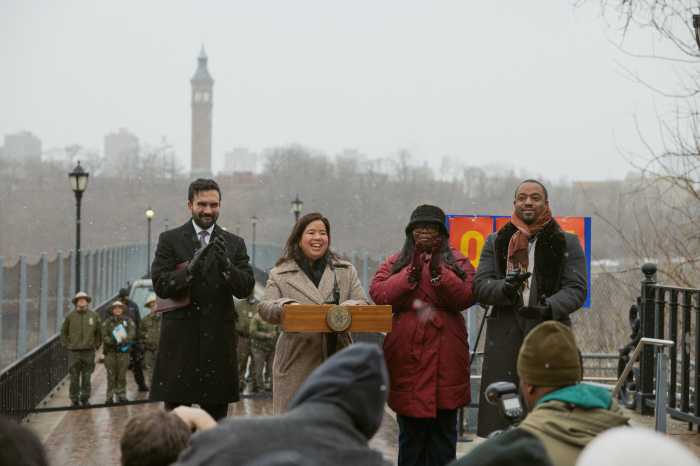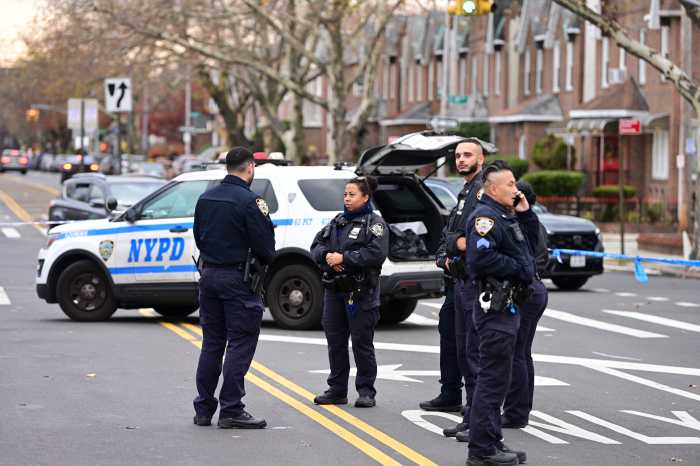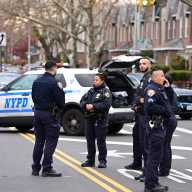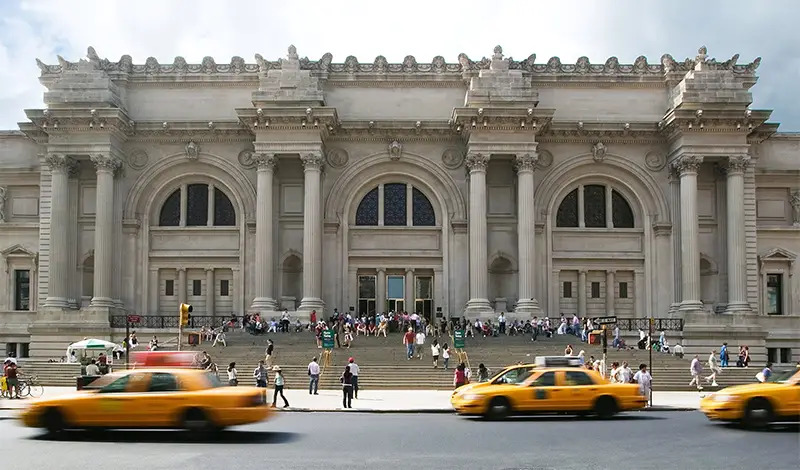The rejection by two key City Council committees of a zoning change that
would have allowed the construction of a 130,000-square-foot BJ’s
Wholesale Club big box store in the Bronx this week may have indicated
a coming shift in council consideration of big box stores.
Or, it could have to do with the influence of union and other lobbyists.
“Politics plays a role. It definitely does,” said Richard Lipsky,
a lobbyist for several groups of organized labor unions.
“There’s a whole host of reasons as to why this stuff happens
and why it doesn’t happen,” he told The Brooklyn Papers this
week.
The action by the council’s Zoning and Franchises and Land Use committees
left Red Hook residents who had opposed construction of a 346,000-square-foot
Ikea store in their neighborhood wondering where all the big-box opposition
was when their forces were gathered at each step in the city’s land
use review process.
“How can the council reject a store close to a highway [Bruckner
Expressway] because of too much traffic, but then approve an anti-union
one that’s three times larger that’s next to a park?” asked
John McGettrick, a petitioner in a lawsuit against the city and Ikea,
who chairs the Red Hook Civic Council.
“The situation calls for a proper investigation to see if the council
was improperly influenced,” McGettrick said. “On the face of
it, it just defies logic.”
In the wake of Wal-Mart’s announced plans to move to the city —
the first is planned for Rego Park, Queens, but the nation’s largest
retailer is reportedly checking out sites in Brooklyn, as well —
council members have expressed concern about labor practices employed
by the mega-retailers that have been raised by scores of lobbyists and
union organizers.
The same day that news of the committee’s vote against BJ’s
was reported, McGettrick and other Red Hook residents joined a group called
the Coalition to Revitalize Our Waterfronts Now (CROWN) in announcing
a lawsuit that calls the city’s approval of Ikea illegal.
That followed a slew of fines issued last month to Ikea’s contractors
on the Red Hook site by the city Department of Environmental Protection.
“I’m concerned about the environmental issues that have been
raised,” said Councilwoman Letitia James, a critic of big box stores
who nevertheless voted to approve Ikea. Those fines were for understated
estimates of asbestos in a Civil War-era building that was demolished.
But local council members, labor organizers and lobbyists all agreed that
the key element that made box stores like BJ’s and Wal-Mart repulsive
to elected officials was the thing that made the Ikea plan attractive
to them: Labor.
“Ikea’s labor practices are light years ahead of Wal-Mart and
BJ’s,” said Lipsky, a lobbyist who formed the group Neighborhood
Retail Alliance, which works with union organizers.
“The wages and benefits are much different. Ikea, even though it
is non-union, they’re paying high wages and benefits. You have a
whole different difficulty with organizing.”
It is the labor support, he said, that means votes and campaign dollars
to elected officials.
“Don’t forget that in the Ikea situation, Ikea also hired a
very well-connected lobbyist, Yoswein New York,” Lipsky said, referring
to the public relations firm owned by Joni Yoswein, a former assemblywoman
from Midwood who is now a major lobbyist for a wide range of private and
public corporations.
In 2002, Yoswein was a top fundraiser for Council Speaker Gifford Miller’s
campaign, bringing in $25,425 through her lobbying efforts, according
to the Village Voice.
“It matters how you organize, who your stakeholders are, and who
you organize. I didn’t get a fervent call from all the furniture
stores to help out,” said Lipsky.
Pat Purcell, a labor organizer, said the unions carry a lot of weight
on council votes.
“At the end of the day, almost a million workers in the city are
unionized. At the end of the day, that’s a very powerful thing. That
is their constituents,” Purcell said.
“They’re going to listen to our members. They know this is our
members and we’re speaking on their behalf.”
Purcell, an organizer for United Food and Commercial Workers Union Local
1500 said the unions threw their force against BJ’s after the retailer
“raised the ire of the labor community. I think Ikea doesn’t
have that, necessarily.”
Purcell pointed to a case involving a BJ’s in East New York where
two female workers were arrested for shoplifting on June 30, 2004. The
women say the charges were false and brought against them because they
were trying to organize a union.
A spokesman for the Brooklyn district attorney’s office said the
matter was settled without any charge of guilt.
“The fact that you don’t have a furniture store union in the
city is probably why you saw a lack of the issue being raised,” he
said.
“You didn’t see the other side of the coin, other than Ikea
saying, ‘We’re the greatest thing ever, when we come here it
will be great and we’ll bring lots of great jobs with us,’”
Purcell said.
Councilman Charles Barron, who represents East New York, was the only
council member to vote against Ikea when the application came before the
council in October.
While Barron characterized BJ’s as a “horrifying experience
out in my area in Brooklyn” he said he voted against Ikea to make
a point.
“We have to talk to the larger questions around development, and
not let these guys with billions of dollars be like little dictators that
determine the process by which land is used,” Barron said.
“The City Council is in power to protect the citizens of New York
from rich, greedy developers who express no caring about traffic congestion
and environmental concerns,” he said, noting the top two complaints
of Ikea’s opponents in and around Red Hook.
Councilwoman Letitia James, who represents parts of Downtown Brooklyn,
including a site where it was reported Wal-Mart was interested in developing
a new store, said that although she voted in favor of the Ikea, she believes
the committee went against BJ’s for having “some adverse impact
on locally owned and operated businesses, and they had general concern
for traffic.”
Land Use committee chairwoman Melinda Katz, of Queens, stood against the
opinions of elected officials from the Bronx district, who all favored
the BJ’s plan, on grounds that are all too familiar to Red Hook residents
who oppose Ikea.
In her recommendation to the committee, Katz said, “The issue of
traffic has been the main issue since the beginning.”























